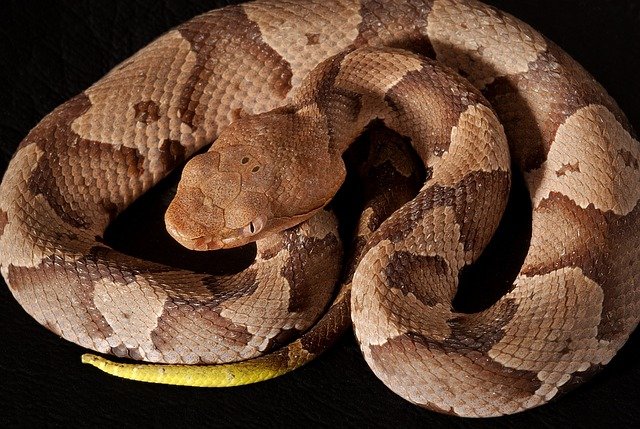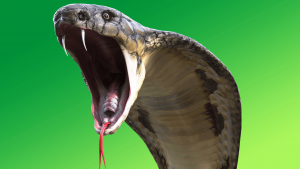
What Types of Venomous Snakes Should Dog Owners Be Aware of in Virginia?
There are 3 types of venomous snakes in Virginia, all of which belong to the pit viper family: the Eastern Copperhead, Timber/Canebrake Rattlesnake, and Northern Cottonmouth.
Copperheads are the most commonly seen and widely distributed venomous snake in Virginia and can be spotted in every county. Rattlesnakes are second most populous, having been accounted for in 45 Virginia counties, most in Western Virginia. Cottonmouths are the most rare, with sightings in 13 counties, all on the southeast coast.
How Venom Makes a Snake Bite Dangerous
The venom of pit vipers contains hemotoxins. Hemotoxins can cause red blood cells to burst and disrupt the normal blood clotting process. This leads to severe bruising and swelling of tissues. Internal bleeding can occur in serious cases.
The accumulation of dead red blood cells from tissue damage and disruption in the coagulation process can build up in the bloodstream and cause kidney and heart damage. Hemotoxins can also cause a very acute drop in blood pressure or in some rare cases an anaphylactic reaction.
Snakes Typically Bite Dogs on the Muzzle
Dogs are typically bitten on the muzzle while cats are more likely to be bitten on the paws. Cats are quicker and more agile than dogs and can typically get out of the way of a bite whereas a dog may go directly for a snake with its mouth. Snake bites are one of the most painful injuries we see in pets.
Pets are typically visibly uncomfortable and the site of the bite is difficult to touch or clean due to severe pain. There is often marked swelling and even visible bruising and bleeding just minutes after an envenomation.
How Veterinarians Diagnose a Snake Bite
Venomous snake bites can cause a wide range of clinical signs- some very dangerous and some not. The first step is to give the pet a complete physical exam and check vital parameters (temperature, heart rate, respiratory rate, gum color).
It is important to run bloodwork to check your pet’s platelet count and blood coagulation times to make sure they aren’t at risk for acute blood loss. In some cases it may be recommended to run tests to check organ (especially kidney) function as well.

How Veterinarians Treat Snake Bites in Pets
The most helpful treatment for pit viper envenomation is antivenin. Antivenin is the only treatment that neutralizes the hemotoxin released in the venom. This helps to stop tissue and red blood cell damage before it becomes a problem.
Antivenin can be used up to 72 hours after a snake bite, but the sooner the better. It is given in an infusion over an hour while your pet’s vitals are monitored closely for signs of a reaction or negative response. Some pets may not need antivenin if their bloodwork is normal and they are comfortable after pain medication.
Pain medication is paramount in the treatment of snake bites. We typically give patients an initial injection of an opioid painkiller before physical exam, followed by a constant infusion or intermittent injections, depending on the case.
Wound care such as clipping and cleaning the bite wounds, icing the wounds, or applying ointment may be helpful as well. Antibiotics are typically not needed but can be used if there is a large amount of tissue damage present.
Will My Pet Recover From a Snake Bite?
Your pet’s prognosis depends on many factors- species, age, size, heath status, and type of snake. Typically larger dogs have a better prognosis than small dogs or cats. Any animal that is bitten anywhere other than in the skin (eye, mucous membranes, tongue) has a poorer prognosis and will suffer more tissue damage.
Animals with concurrent health problems (heart disease, kidney disease, infections, auto-immune diseases) are at greater risk. Copperhead bites have a better prognosis than Cottonmouth or Rattlesnake bites.
Call Your Vet Immediately if Your Pet is Bit By a Snake
The most important thing to do when you realize that your pet may have been bitten by a snake is to see your veterinarian for a physical exam. VETSS is Charlottesville’s only 24 hour emergency clinic, and is experienced in treating snake bites. Call us at (434) 973-3519.
Do not give any medications at home before going to the vet’s office. After physical exam your veterinarian will determine the best diagnostics and treatment plan based on your pet’s unique situation.
For more information, contact our team at VETSS, a Charlottesville VA urgent care animal hospital!
